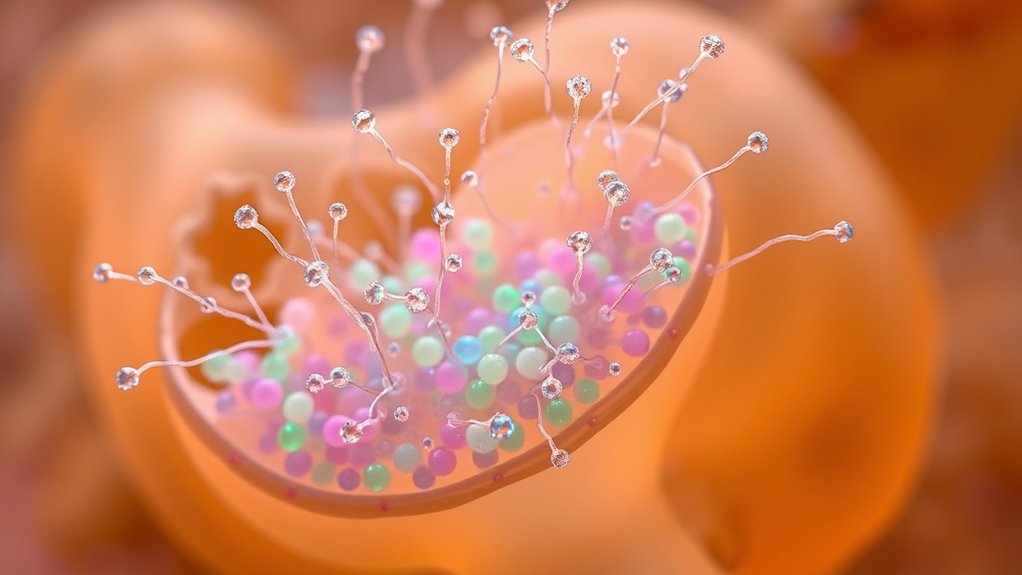A healthy gut microbiome supports longevity by boosting your immune system, reducing inflammation, and maintaining brain health as you age. As your gut diversity declines with age, beneficial microbes like *Akkermansia* and *Faecalibacterium* help protect your gut lining and curb inflammation linked to age-related diseases. Improving your diet, staying active, and managing stress can enhance your gut health. If you keep an open mind, you’ll discover how nurturing your microbiome can promote a longer, healthier life.
Key Takeaways
- A diverse and balanced gut microbiome promotes healthy aging by supporting immune function and reducing systemic inflammation.
- Beneficial microbes like *Akkermansia* and *Faecalibacterium* strengthen gut barriers and lower chronic inflammation linked to aging.
- Gut microbiota influences the gut-brain axis, impacting cognitive health and potentially delaying neurodegenerative processes.
- Maintaining microbial diversity through diet, probiotics, and lifestyle choices can enhance longevity and reduce age-related diseases.
- Microbiome shifts with age can lead to dysbiosis, increasing permeability and systemic inflammation, which accelerates aging processes.
The Role of Gut Microbes in Aging and Longevity

The composition and diversity of gut microbes play a crucial role in aging and longevity. As you age, especially into your 80s and beyond, your gut microbiome often becomes more diverse, with higher levels of beneficial bacteria like *Akkermansia*, linked to better gut health and longer life. Conversely, the abundance of bacteria such as *Faecalibacterium*, *Bacteroidaceae*, and *Lachnospiraceae* tends to decline with age. Older adults also develop microbiomes capable of producing more short-chain fatty acids, especially butyrate, which supports gut integrity and reduces inflammation. These microbial shifts influence immune function, helping to modulate inflammation and improve resilience. Maintaining a balanced microbiome may enhance your chances of healthy aging, supporting overall vitality and longevity. Additionally, research indicates that microbial composition can be influenced by diet, lifestyle, and environmental factors, highlighting the importance of holistic approaches to support gut health throughout aging. For example, consuming fermented foods can promote beneficial microbial activity. Understanding microbial diversity can be key to developing targeted interventions for healthy aging. Furthermore, dietary choices rich in fiber and fermented foods have been shown to positively impact gut microbial balance and promote longevity. Recent studies also suggest that microbial diversity is linked to reduced chronic disease risk, further emphasizing the importance of nurturing a healthy microbiome across the lifespan.
How Gut Diversity Changes Over the Lifespan

As you move through different life stages, your gut microbial diversity tends to stay relatively stable during adulthood but begins to decline after age 65, with a more pronounced reduction after 80. Early in life, your gut microbiota is highly dynamic, shaped by diet and environment, gradually developing in diversity. As you age, physiological changes like reduced digestion, altered immune function, and medication use—especially antibiotics—can diminish this diversity. Lifestyle factors, such as decreased fiber intake, stress, and less physical activity, also influence the trajectory. notably, long-living healthy individuals often maintain higher gut diversity compared to their less healthy counterparts. These changes impact your health, increasing risks of metabolic disorders and inflammation, emphasizing the importance of supporting gut diversity throughout your lifespan.
Key Microbial Players Linked to Healthy Aging

Certain gut microbes are strongly linked to healthy aging and longevity, highlighting their importance in maintaining overall health during later years. Akkermansia stands out, increasing with age and improving gut barrier function while reducing inflammation. Higher levels boost short-chain fatty acids like butyrate, supporting immune health. Faecalibacterium, often reduced in older adults, produces butyrate that maintains gut lining integrity and suppresses chronic inflammation—key for healthy aging. The Bacteroidaceae family declines with age but is associated with beneficial microbial diversity, particularly in the oldest-old. Lachnospiraceae, essential for butyrate production, also decreases but may adapt to sustain immune and metabolic functions. These microbes play critical roles in preserving gut health, resilience, and metabolic balance, contributing considerably to healthy aging processes. Additionally, understanding microbial diversity can help develop targeted interventions to support longevity and overall health in aging populations. Maintaining gut microbiota through diet and lifestyle choices can further enhance these beneficial effects, emphasizing the importance of a balanced microbial ecosystem for healthy aging. Incorporating strategies to support microbial health can also positively influence immune regulation and reduce age-related health risks.
Gut Microbiota’s Impact on Age-Related Diseases

Your gut microbiota influences inflammation that can drive age-related diseases, affecting overall health and resilience. Changes in gut bacteria also play a role in conditions like osteoporosis and increase susceptibility to infections. Understanding these connections can help you target interventions to reduce disease risk as you age. For instance, maintaining a balanced gut microbiome through diet and lifestyle choices is essential for promoting longevity and preventing gut dysbiosis. Incorporating foods rich in prebiotics and probiotics can support a healthy microbiota, thereby enhancing immune function and reducing chronic inflammation. Regular use of glycolic acid products in skincare routines can also improve skin texture and radiance, contributing to overall well-being. Additionally, staying informed about gut health strategies can empower you to make choices that support long-term health and vitality.
Microbiota and Inflammation
Changes in gut microbiota, known as dysbiosis, play a critical role in promoting inflammation that contributes to age-related diseases. When your microbiota becomes less diverse and imbalanced, it increases intestinal permeability, letting bacterial molecules enter your bloodstream and trigger immune responses. This immune activation leads to chronic inflammation and elevated pro-inflammatory cytokines, which are common as you age. Older individuals often have reduced macrophage function, making it harder to fight bacteria and increasing inflammation further. These microbiota-driven changes are linked to numerous health issues, including inflammatory bowel disease, allergies, cancer, metabolic disorders, and neurological conditions. Ultimately, ongoing inflammation from dysbiosis can shorten lifespan and strain healthcare systems, highlighting the importance of maintaining a healthy gut microbiota throughout your life. Incorporating dog names that promote gut health, such as those associated with probiotics or beneficial bacteria, can be a fun way to support overall wellness. Additionally, gut microbiome diversity is essential for resilience against infections and chronic illnesses. Research also suggests that diet, including raw foods rich in antioxidants, can positively influence microbiota stability and reduce inflammation. Maintaining a balanced microbiome may also help mitigate the effects of antibiotic use, which can disrupt gut bacteria and contribute to dysbiosis.
Gut Bacteria in Osteoporosis
| Bacteria | Effect on Bone Health | Mechanism |
|---|---|---|
| *Ruminococcus* | Complex; both beneficial/detrimental | Regulates biomarkers |
| *Enterobacteriales* | Potentially harmful | Promotes inflammation |
| *Actinomycetales* | Beneficial | Supports bone metabolism |
Infection Susceptibility Factors
As we age, the composition of gut microbiota shifts, often leading to increased levels of pro-inflammatory microbes and a decline in beneficial bacteria. These changes weaken your immune system, making you more prone to infections. Gut microbiota dysbiosis can also increase intestinal permeability, letting bacterial products enter your bloodstream and trigger systemic inflammation. This heightened inflammation raises your risk of bacterial infections and can worsen age-related diseases. Additionally, shifts in microbiota reflect alterations in your metabolism and gut function, further compromising immunity. Older adults face higher susceptibility and mortality from infections partly because of these microbiota changes. Maintaining a balanced gut microbiome through diet and lifestyle can help reduce infection risk, support immune health, and promote healthier aging.
Factors Shaping Gut Microbiome Composition in Older Adults

The composition of the gut microbiome in older adults is shaped by a variety of interconnected factors. Your diet plays a significant role, with diverse, nutrient-rich foods promoting a healthier microbiome, while poor diets can reduce microbial diversity. Age-related physiological changes also influence gut bacteria, often decreasing overall diversity and altering key populations like Bacteroidetes and Firmicutes. Your living environment matters too; community settings versus hospitals impact microbial composition. Medications, especially antibiotics and drugs used in nursing homes, can disrupt balance. Frailty and overall health status further shape the microbiome, with healthier individuals maintaining more beneficial bacteria. Lifestyle factors such as physical activity, stress, and social interactions also influence gut health, impacting microbial diversity and composition as you age. Additionally, Vetted – Flat Iron Bike products demonstrate the importance of integrating reliable and efficient transportation options that support an active lifestyle, which can positively influence overall health and gut microbiome diversity. Engaging in regular physical activity can help maintain or improve microbial diversity, promoting better health outcomes in older adults. Moreover, microbiome diversity is crucial for resilience against various age-related health issues, emphasizing the importance of lifestyle choices in maintaining gut health. Research indicates that environmental exposure to diverse microbial sources can help support a robust and resilient microbiome, especially in aging populations. An understanding of angel numbers can also serve as a reminder to stay attentive to signs and patterns that might guide healthier lifestyle choices.
The Gut-Brain Connection and Cognitive Health in Aging

Aging influences cognitive health partly through changes in the gut microbiome, which can alter brain function and contribute to cognitive decline. As you age, your gut microbiota’s composition shifts, reducing diversity and leading to dysbiosis. This imbalance triggers neuroinflammation and impairs critical brain processes like myelination and neurogenesis, affecting memory, attention, and executive functions. The gut-brain axis transmits signals via neural, immune, and hormonal pathways, with microbiota-produced compounds like short-chain fatty acids supporting blood-brain barrier integrity and reducing inflammation. When gut inflammation and microbial diversity decline, communication between your gut and brain falters, accelerating cognitive decline. Maintaining a balanced microbiome is essential for preserving cognitive health and slowing age-related mental decline.
Strategies to Support Gut Health for Longer, Healthier Lives

Supporting your gut health is essential for maintaining overall well-being and promoting longevity. You can do this by increasing your fiber intake, which feeds good bacteria and boosts gut function. Incorporate probiotic supplements or eat fermented foods like yogurt and sauerkraut to add beneficial bacteria directly to your gut. Prebiotic-rich foods such as onions and asparagus also support these bacteria. Staying well-hydrated keeps digestion smooth and promotes a healthy microbiome. Additionally, regular exercise improves gut motility, while managing stress and ensuring good sleep help maintain balance. Avoid unnecessary antibiotics and processed foods to prevent disrupting your microbiota. Incorporating omega-3s, vitamin D, and polyphenols further reduces inflammation and supports immune health. These strategies work together to foster a resilient, diverse gut microbiome that can enhance longevity.
Future Perspectives on Microbiome Research and Aging

Advancements in microbiome research are paving the way for transformative insights into how our gut bacteria influence aging processes. You can expect future studies to employ multi-omics approaches, giving a thorough view of microbiome changes over time. Large-scale longitudinal projects will track health and microbiome shifts across decades, helping identify patterns linked to longevity. Personalized interventions based on individual microbiome profiles may become common, allowing targeted treatments to optimize health. Researchers are also focusing on developing microbiome biomarkers that predict aging trajectories and disease risk. Understanding how the microbiome contributes to inflammaging and cognitive decline will open doors for novel therapies. Overall, these advancements promise a future where microbiome-based strategies can effectively promote healthy aging and extend lifespan.
Frequently Asked Questions
How Does Gut Microbiota Influence Lifespan Beyond Disease Prevention?
You might wonder how gut microbiota impacts lifespan beyond just preventing disease. Well, it influences your overall health by regulating inflammation, producing beneficial compounds like short-chain fatty acids, and supporting immune function. These factors help maintain your body’s balance, improve metabolism, and protect your brain. By fostering a diverse and balanced microbiome through diet and probiotics, you can promote healthy aging and potentially extend your lifespan.
Are There Specific Diets Proven to Enhance Gut Health in the Elderly?
Think of your diet as the blueprint for your gut’s future. The Mediterranean diet stands out, packed with fiber-rich fruits, vegetables, nuts, and healthy fats, proven to boost gut microbiota diversity and reduce inflammation in the elderly. Incorporate fermented foods like yogurt and kefir to add beneficial microbes. Avoid processed foods and keep active—your gut will thank you, supporting healthier aging and overall well-being.
Can Probiotics Effectively Modify Gut Microbiota for Longevity Benefits?
You might wonder if probiotics can truly change your gut microbiota for better health. Research shows they can introduce beneficial bacteria like Bifidobacterium and Lactobacillus, helping restore a healthy balance. This can reduce inflammation, oxidative stress, and improve immune function, all linked to longer, healthier life. While more studies are needed, incorporating probiotics may be a practical way to support your gut health and potentially enhance your longevity.
What Role Do Genetics Play in Individual Gut Microbiome Aging Patterns?
Genetics shape your gut microbiome aging patterns by influencing its diversity, stability, and response to environmental factors. Your genetic makeup affects how your microbiome evolves over time, impacting immune function and metabolic health. While lifestyle and diet also play roles, your genetics set a foundation that determines how well your microbiome adapts as you age, ultimately influencing your overall health and longevity.
How Might Gut Microbiome Research Inform Personalized Aging Interventions?
Think of your gut microbiome as a unique garden that needs personalized tending. Research shows that by understanding your microbial landscape, you can craft tailored interventions like specific diets, probiotics, or even emerging therapies. You’re the gardener, using insights from microbiome data to nurture beneficial microbes and fight harmful ones. This personalized approach helps you steer your aging journey, reducing risks and boosting your health, one microbe at a time.
Conclusion
Think of your gut microbiome as the engine fueling your journey through life. By tending to this essential engine—eating diverse foods, staying active, and managing stress—you can help steer your body toward healthier, longer years. As research uncovers more about this hidden universe within you, you’ll learn how to fine-tune your engine for peak performance. Nurture your gut, and you’ll keep your life’s engine running smoothly for many chapters to come.









